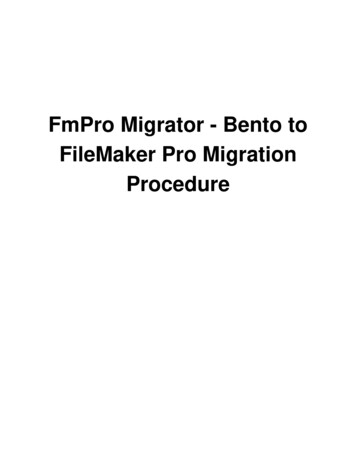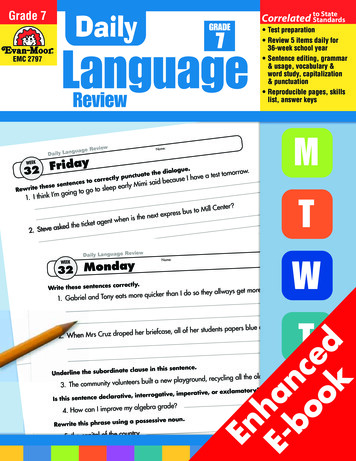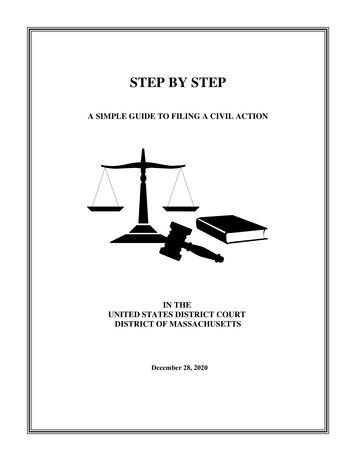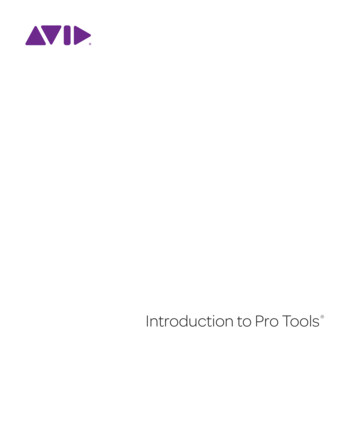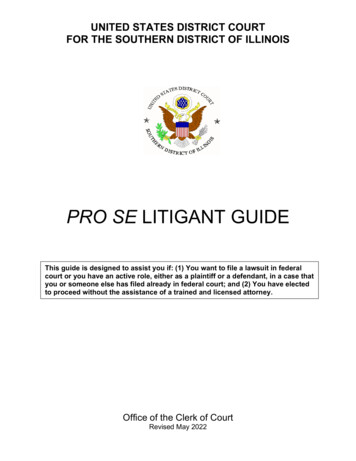
Transcription
UNITED STATES DISTRICT COURTFOR THE SOUTHERN DISTRICT OF ILLINOISPRO SE LITIGANT GUIDEThis guide is designed to assist you if: (1) You want to file a lawsuit in federalcourt or you have an active role, either as a plaintiff or a defendant, in a case thatyou or someone else has filed already in federal court; and (2) You have electedto proceed without the assistance of a trained and licensed attorney.Office of the Clerk of CourtRevised May 2022
TABLE OF CONTENTSI. GENERAL INFORMATION. . 1A.BASIC DEFINITIONS. .1B.HOW THIS GUIDE CAN HELP. .1C.THE RISKS INVOLVED IN REPRESENTING YOURSELF. .1II. IMPORTANT ISSUES. . 2A.IS THIS COURT THE APPROPRIATE COURT TO HEAR YOUR DISPUTE? .2B.IF THE CASE CAN BE FILED IN FEDERAL COURT, IS IT THE TYPE OF CASE IN WHICHLITIGANTS TYPICALLY REPRESENT THEMSELVES? .2C.IS THERE AN ALTERNATIVE TO REPRESENTING YOURSELF THAT IS AFFORDABLE?.3D.WHAT IF YOU CANNOT FIND AN ATTORNEY TO TAKE YOUR CASE? .3E.WHAT COURT FEES AND COSTS ARE YOU REQUIRED TO PAY? .4F.WHAT IF YOU CANNOT AFFORD TO PAY THE FEES? .4G.WHERE CAN YOU FIND THIS COURT’S RULES OF PROCEDURE AND APPLICABLE FEDERALLAWS IF PROCEEDING PRO SE? .5III. HOW DO YOU START A NEW CIVIL CASE? . 6A.FILE A COMPLAINT. .6B.SERVE THE COMPLAINT. .6IV. WHAT HAPPENS NEXT? . 8V. HOW DO YOU SUBMIT DOCUMENTS TO THE COURT? . 9VI. HOW DO YOU OBTAIN INFORMATION ABOUT THE STATUS AND PROGRESSOF YOUR CASE? . 10VII. IS IT POSSIBLE TO SPEAK DIRECTLY TO A JUDGE OR MEMBER OF HIS/HERSTAFF ABOUT YOUR CASE? . 10VIII. WHAT HAPPENS IF YOUR CASE IS DISMISSED? . 11APPENDIX OF FORMS . 12
U.S. District CourtSouthern District of IllinoisI. GENERAL INFORMATION.A.BASIC DEFINITIONS.The plaintiff and defendant in a court case generally are referred to as the“parties” or “litigants.” The plaintiff asserts a claim or right protected by law against thedefendant; the defendant denies the claim or right. Then the court determines whetherthe asserted claim or right has merit. The great majority of litigants who appear in thiscourt are represented by an attorney who has been trained in the law and is familiar withcourt rules and procedures. Parties who are not represented by licensed attorneys (whoelect to represent themselves) are referred to as pro se litigants (pro se plaintiff or prose defendant). The term “pro se” is simply a Latin phrase that means “for yourself.”B.HOW THIS GUIDE CAN HELP.This guide will not answer all questions about what you need to do to representyourself effectively as a pro se litigant. It outlines the basic steps that are required to filean action (also known as a lawsuit) in this district court. It also provides some generalguidance on the next steps in the process once you have filed an action.You are responsible for learning and following the procedures that govern thecourt process. Although the staff of the clerk’s office can provide generalinformation concerning court rules and procedures, staff is forbidden as amatter of law from providing legal advice, from interpreting and applying courtrules, or otherwise participating, directly or indirectly, in any action.C.THE RISKS INVOLVED IN REPRESENTING YOURSELF.Self-representation carries certain responsibilities and risks that a pro se litigantshould know before proceeding. The court encourages all individuals who are thinkingabout self-representation to carefully review the risks associated with self-representationand to be aware of the potential consequences. Rule 11 of the Federal Rules of CivilProcedure prohibits the filing of lawsuits that are clearly frivolous or filed merely to harasssomeone. If, after reviewing your complaint, a judge determines that you have filed alawsuit for an improper or clearly unnecessary purpose, the judge may impose sanctionsagainst you, including ordering you to pay a fine to the court or to pay the legal fees ofthe person or persons against whom you filed the lawsuit.Pro Se Litigant Guide (Revised May 2022)Page 1
U.S. District CourtSouthern District of IllinoisII. IMPORTANT ISSUES.You should consider these important issues before you decide to representyourself in an action before this district court:A.IS THIS COURT THE APPROPRIATE COURT TO HEAR YOUR DISPUTE?Federal courts can only decide limited kinds of cases. The United States DistrictCourt for the Southern District of Illinois is one of 94 trial courts in the federal court system.A federal trial court is authorized to hear disputes that fall into the following four categoriesonly: Those that deal with a question involving the United States Constitution; Those that involve questions of federal law, as opposed to state law; Those that involve the United States of America as a party, whether asplaintiff or defendant; and Those that involve a dispute among citizens of different states when theamount in controversy exceeds 75,000.00, exclusive of interest and costs.(Note: A person is a citizen of the state where he or she is physically presentwith an intent to remain there indefinitely.)If your complaint does not fall under any of these categories,you should not file it in federal court. Instead, you should contact the CircuitCourt in the county in which you live.B.IF THE CASE CAN BE FILED IN FEDERAL COURT, IS IT THE TYPE OFCASE IN WHICH LITIGANTS TYPICALLY REPRESENT THEMSELVES?A litigant may appear pro se in any case that is properly within the jurisdiction ofthis court. There are five categories of cases that are most often filed by pro se litigants: Cases alleging denial of civil rights under Title 42, United States Code,Section 1983, that are not filed by prisoners; Cases alleging denial of civil rights under Title 42, United States Code,Section 1983, filed by persons who are in jail or prison and who challengetheir sentences or conditions of confinement; Cases alleging a tort claim which is an injury to an individual (note that tortclaims brought in federal court are subject to strict jurisdictionalPro Se Litigant Guide (Revised May 2022)Page 2
U.S. District CourtSouthern District of Illinoisrequirements);C. Cases alleging employment discrimination under Title 42, United StatesCode, Section 2000(e); and Cases seeking judicial review of a decision by the Commissioner of SocialSecurity.IS THERE AN ALTERNATIVE TO REPRESENTING YOURSELF THAT ISAFFORDABLE?Most people who file and pursue litigation in federal court employ a licensed,practicing attorney who has appeared in court and is familiar with the rules of procedurethat govern the court process. If you would prefer to have an attorney represent you butyou are unable to afford one, you should consider contacting one of the followingIllinois Lawyer Finder: (217) 525-5297 or toll free (800) 922-8757www.illinoislawyerfinder.comLand of Lincoln Legal Assistance: (618) 394-7300 or toll free (877) 342-7891www.lollaf.orgThese agencies can explain the various options for obtaining and paying for legalservices.D.WHAT IF YOU CANNOT FIND AN ATTORNEY TO TAKE YOUR CASE?If you cannot find an attorney to represent you, you have the right to file an actionon your own. Remember, however, that as a pro se litigant, you are representing onlyyourself and presenting only your claims or defenses. Under the law, you cannot speakfor another person, a company, or an entity (such as a club or association that includesother individuals). When you appear pro se, you must follow the same rules andprocedures that licensed attorneys who practice in this court must follow. Generally,judges hold pro se litigants to the same standards of professional responsibility as trainedattorneys.Pro se litigants may also ask the court to recruit an attorney (also called “counsel”)for them in a civil case. Pro se litigants have no right to be represented by counsel in acivil case, and the court has no obligation to appoint counsel in a civil case. All this courtcan do is try to find a lawyer to volunteer to assist a pro se litigant. The court will attemptto recruit counsel in a few select cases where having an attorney seems appropriate orimportant. You must first show that you have tried to find counsel to represent you buthave been unsuccessful (and provide proof of your efforts). The court needs to knowother information, which is requested in the court’s “Motion for Recruitment of Counsel”Pro Se Litigant Guide (Revised May 2022)Page 3
U.S. District CourtSouthern District of Illinoisform. If you would like to request that the court recruit counsel to represent you in yourlawsuit, you must file a motion for recruitment of counsel with the court. The motion shouldbe filed at the time you file the complaint, but it can be filed at any time. A sample of amotion for recruitment counsel is attached in the Appendix Section.E.WHAT COURT FEES AND COSTS ARE YOU REQUIRED TO PAY?The fees charged by the United States District Court, Southern District of Illinois,are as follows:Filing a complaint and opening of a civil case: 402.00Filing a notice of appeal: 505.00Copies of documents, per page: .50Copies of any record or document accessed electronicallyat a public terminal in the clerk’s office: .10Certification of a document from a court file: 11.00Electronic Retrieval 19.90 0.65/pageThese fees may be paid with a money order, check, or major credit card.If you are unable to pay the filing fee, you may apply for permission to proceed informa pauperis, a Latin phrase for “in the form of a pauper”. Information on filing in formapauperis is discussed below, and a sample motion to proceed in forma pauperis is locatedin the Appendix Section. These forms are also available in the clerk’s office and on thecourt’s website, www.ilsd.uscourts.gov. Completed motions are forwarded to a judge forreview. If your motion is denied, your case cannot proceed until you pay the filing fee. Ifthe fee is not paid, the case will be dismissed.Waiver of the filing fee does not automatically waive the other costs associatedwith pursuing or litigating your case. If, for example, you need copies of documents inyour case, the clerk’s office is required to charge a fee per page for those documents asset forth above. Service of your complaint on the other party will entail additional costsunless you have made (and the court has approved) a motion that the United StatesMarshal serve your complaint.F.WHAT IF YOU CANNOT AFFORD TO PAY THE FEES?As noted above, filing a case in this court requires the plaintiff to pay a 402.00Pro Se Litigant Guide (Revised May 2022)Page 4
U.S. District CourtSouthern District of Illinoisfiling fee at the time the new case is filed. If you are unable to pay this fee, you may applyto have the fee waived. Bear in mind that you can apply for waiver of the fee only afteryour action is filed. The clerk’s office will accept your case without payment if, at the timeyou file it, you also apply for waiver of the fee by filing a motion to proceed in formapauperis as discussed below. If the judge subsequently denies your motion, you will berequired to pay the filing fee; if you do not pay it within a specified period of time, yourcase will be dismissed. Note that if your case is dismissed for non-payment of the fee,you will still owe that fee to the court. In other words, your obligation to pay the filing feebegins when you file your case, regardless of the outcome of your lawsuit. On the otherhand, if the judge grants your motion to waive the filing fee, and you later settle your casefor a monetary payment or win at trial, any money you recover must be first paid to theClerk of Court so that your fees and costs can be deducted to reimburse the court. SeeSDIL-LR Rule 3.1(c)(1).The application process requires that you complete and submit a motion toproceed in forma pauperis. A sample of this motion is attached in the Appendix Section.The clerk’s office will provide the case number. You must answer all questions truthfullyand completely. If you own real estate or automobiles that have outstanding mortgagesor loans, you should be very specific about your debt balance so the judge who reviewsthe motion has accurate information as to the property’s value. You also must sign thestatement under penalty of perjury.The completed motion should be submitted to the clerk’s office with your complaint.A judge will review the motion, along with the complaint, and the motion will be “granted”or “denied.” A copy of the order explaining the judge’s decision will be mailed to you bythe clerk’s office. As noted above, if your motion is denied, you must pay the filing feewithin the time period specified or your case will be dismissed.G.WHERE CAN YOU FIND THIS COURT’S RULES OF PROCEDURE ANDAPPLICABLE FEDERAL LAWS IF PROCEEDING PRO SE?As a pro se litigant, you should be familiar with the Federal Rules of Procedure.These rules set forth the procedural requirements for litigating cases in all federal courts.As a pro se litigant in a civil case, you should be familiar with the Federal Rules of CivilProcedure (abbreviated as Fed.R.Civ.P) and the Federal Rules of Evidence (abbreviatedF.R.E.). If you are a pro se defendant in a criminal case, you should familiarize yourselfwith the Federal Rules of Criminal Procedure (abbreviated as Fed.R.Crim.P.) and theFederal Rules of Evidence. Federal laws are found in the United States Code(abbreviated U.S.C.). These rules and laws are available for review at law libraries. Youmay also access the federal rules on the internet at www.uscourts.gov/rules.You should also be familiar with the Local Rules for the Southern District of Illinois(SDIL-LR). A paper version of the Local Rules can be purchased at the clerk’s office ateither the East St. Louis or Benton locations for 3.00. For more information, please callthe clerk’s office in East St. Louis at (618) 482-9371 or in Benton at (618) 439-7760. Youmay also view these Rules at our website, www.ilsd.uscourts.gov.Pro Se Litigant Guide (Revised May 2022)Page 5
U.S. District CourtSouthern District of IllinoisIII. HOW DO YOU START A NEW CIVIL CASE?A.FILE A COMPLAINT.A case begins when a plaintiff, the person bringing the lawsuit, files a complaint.The complaint is the document in which the plaintiff asserts the claim(s) or rights(s) beingviolated and outlines the problem or reason for the lawsuit. Sample complaints areavailable on the court’s website, www.ilsd.uscourts.gov and/or from the clerk’s office. Asa pro se party, the complaint must be filed by hand-delivering or mailing it to the clerk’soffice at either of the two addresses listed below:United States District Court750 Missouri AvenueEast St. Louis, IL 62201United States District Court301 W. Main StreetBenton, IL 62812Whether you deliver or mail your complaint, you must submit the following: The original complaint with your full name, address, and telephone number. The 402.00 filing fee or a motion to proceed in forma pauperis if you cannotafford to pay the filing fee. Note: the subject of fees and how to seek informa pauperis status is discussed above.The complaint will be given a case number and assigned to a judge by the clerk’soffice. If you would like a file-marked copy of the complaint (or any other pleading)returned to you, please provide an additional copy at the time you file the original.Please note that a pro se party may not file their initial complaint through theCourt’s electronic case filing (“ECF”) system. As detailed in Section V. below, a pro separty must hand-delivery or mail to the Clerk’s Office their complaint first and then seekpermission from the Court to file case-related pleadings and documents through the ECFsystem in every case.B.SERVE THE COMPLAINT.Each defendant (the person whom the plaintiff claims is responsible for the claimor problem) must be notified of the lawsuit through a process that is specified under law.The responsibility for notifying each defendant rests with the plaintiff and is referred to asservice of process. The provisions for service of process are described in Rule 4 of theFederal Rules of Civil Procedure. If the service of process requirements are not followedcorrectly, the case can be dismissed.You have 90 days after the complaint is filed to serve the complaint upon thedefendant(s). It is your responsibility to properly serve the complaint. If you failto do so within 90 days, your case may be dismissed.Pro Se Litigant Guide (Revised May 2022)Page 6
U.S. District CourtSouthern District of IllinoisThe defendant shall be notified of the lawsuit either by service of a summons or bywaiver of service. The summons and waiver of service forms may be obtained from theclerk’s office. Again, detailed provisions on how to serve a defendant are contained inRule 4 of the Federal Rules of Civil Procedure. You should carefully review this rule.The service of process requirements can be satisfied in one of three ways.1.Personal Service: If you choose to satisfy the service of processrequirements by personal service, you will direct someone else to deliver orserve a copy of the complaint and summons on the defendant(s). Personalservice can be performed by anyone who is at least 18 years old and whois not a party in the case. Sheriff’s Departments and private process serverswill do this for a fee.You should first contact the Clerk of Court to obtain a summons form foreach defendant listed in your complaint. You will then fill in the necessaryinformation on the form, including a complete name and address for thedefendant who will be served with the summons. After you complete thesummons form, the Clerk of Court will officially issue the summons; thissimply means that an authorized court employee will sign the form andemboss it with the official seal of the court. The summons and complaintare then ready for service.The person who serves the summons must record on the back of thesummons form his or her name, the name of the person who was served,and the date and time of service. This section of the summons form isreferred to as the return of service, and if it is not completed, service ofprocess is not complete. Rule 4(l) requires confirmation that service hasbeen completed. Such confirmation or proof that the documents have beenserved on the defendant(s) requires that the original summons form with thereturn of service completed be returned to the court and that a copy of theform be left with the defendant.2.Waiver of Service: Rule 4(d) permits a defendant to waive personalservice of process. That means the defendant agrees to respond to yourcomplaint without being served with a summons but accepts a copy of thecomplaint by mail. The clerk’s office can provide you with a waiver of serviceof summons form. You must mail two copies of the waiver of service ofsummons form, a copy of the complaint, and a pre-paid means for returningthe waiver form to you (i.e., a self-addressed, stamped envelope) to eachdefendant named in your lawsuit. If a defendant completes and returns thewaiver, you will be spared the burden of personal service on that defendant.3.Service by a Marshal of Someone Specially Appointed: You may askthe judge to order that service be made by a United States marshal orPro Se Litigant Guide (Revised May 2022)Page 7
U.S. District CourtSouthern District of Illinoisdeputy marshal or by a person specially appointed by the court (at thegovernment’s expense). You must, however, make such a request byformal written motion. An example of this motion is attached in theAppendix Section.Once a defendant has been served with a copy of the complaint, thedefendant must file with the court an answer or some other response withina specified number of days. Under the rules governing service of process,each defendant is required to provide a copy of the response on the plaintiff.IV. WHAT HAPPENS NEXT?After the complaint has been filed and served and the defendants have respondedto the complaint, any one of a number of different procedures may occur.1. Referral to a Magistrate Judge: If your case is initially assigned to a magistratejudge, you will be sent a form asking whether you consent to have your casedecided by a magistrate judge. If all parties consent, your case will be decided bya magistrate judge. If all parties do not consent, your case will be decided by adistrict judge, although certain preliminary issues may still be handled by amagistrate judge.2. Motion Practice: Either party (plaintiff or defendant), may request that the courttake specific action related to the case. To do so, the party prepares a formalrequest or what is referred to as a motion. Local Rule 5.1 provides informationon the preferred form and style of motions in this court. The party then signs themotion, submits it or files it with the Clerk of Court and sends a copy to theopposing party. The opposing party may file with the Clerk of Court a response tothe motion. The response sets forth the reasons why the court should deny ratherthan grant the motion. Local Rule 7.1 sets forth the deadlines and page limitationsthat apply to motions (see box below concerning the distinction betweendispositive and non-dispositive motions). After a response (and sometimes a reply)is filed, the district judge or magistrate judge may schedule a hearing to providethe parties with an opportunity to argue the motion and the objections. Or, thejudge may decide a hearing is unnecessary and rule on the motion by issuing awritten order that either grants or denies (in whole or in part) the relief sought inthe motion.Dispositive vs. Non-Dispositive Motions:Motions fall into two categories: dispositive and non-dispositive.Dispositive motions, if granted, end the case; non-dispositive motions, if granted,affect the case but do not end it. District judges have the authority to rule on both kindsof motions; magistrate judges are authorized to rule on non-dispositive motions only,except on cases consented to them.Pro Se Litigant Guide (Revised May 2022)Page 8
U.S. District CourtSouthern District of Illinois3.Magistrate Judge Report and Recommendation: When a case isassigned to a district judge and one of the parties files a dispositive motion,the magistrate judge is authorized to prepare a written Report andRecommendation, essentially a recommendation that the motion begranted or denied and the reason(s) why. This Report andRecommendation is filed by the magistrate judge, and copies are sent tothe parties. You have only 14 days to file objections to the Report andRecommendation and 14 days to respond to another party’s objections(after you receive a copy). All timely objections and responses are reviewedby the district judge along with the Report and Recommendation. Thedistrict judge then will issue an order that adopts, rejects, or adopts in partand/or rejects in part the magistrate judge’s report and recommendation.When the district judge’s order dismisses the case, the Clerk of Court willprepare and enter a judgment in the case. Such judgment is final and canbe appealed only to the United States Circuit of Appeals for the SeventhCircuit in Chicago, Illinois. See Local Rule 73.1 concerning the procedurefor review of non-dispositive orders and proposed dispositive findings.V. HOW DO YOU SUBMIT DOCUMENTS TO THE COURT?Case related documents that ask the court to take specific action are referred toas motions or pleadings. If, for example, you want to ask the court to do something, youmust do so by means of a written motion. A motion should be supported by a summaryof the law supporting the motion called a memorandum and/or by an affidavit ordeclaration of the movant that provides the court with facts that support the motion. Inpreparing a motion, you should follow the same general format as the sample motionsattached to this Guide in the Appendix Section. Be as specific as possible about the actionyou would like the court to take.Initially, you will not be authorized to use the Court’s electronic case filing (“ECF”)system and must submit your complaint to the Clerk’s Office for filing as directed inSection III.A., above. However, once your complaint is filed, you may choose to file (eitherby hand-delivery or mail to the Clerk’s Office address above) a Motion for Pro Se FilingUser privileges which would authorize you to file pleadings through the ECF system (vialogin and password) on a case-by-case basis should the Court grant your request. Youshould review the Electronic Case Filing Rules on the Court’s website prior to requestingsuch privileges. In the event your request is granted, you will be directed to the Court’swebsite and the Electronic Filing Registration Form as you must register for an e-file onlyaccount via www.pacer.gov before you can utilize the ECF system. Pro se filers mustseek prior Court approval to use the ECF system in each unique case filed.If you are granted Pro Se Filing User Privileges, the Clerk’s Office will not acceptany future paper copies of pleadings for filing on your behalf, nor will it mail paper copiesPro Se Litigant Guide (Revised May 2022)Page 9
U.S. District CourtSouthern District of Illinoisof any pleadings to you. You will be responsible for filing your pleadings via the ECFsystem according to the Electronic Case Filing Rules located on the Court’s website andwill only receive electronic notice of pleadings that are filed.If you are not authorized to use the Court’s ECF system, you shall submit theoriginal of any motion or other pleading you wish to file with the Clerk of Court, but youshould always retain a copy for yourself. If extra copies are submitted to the court, filemarked copies will be returned if a self-addressed stamped envelope is sent to the Clerkof Court with the original pleading. The clerk’s office has two locations; hours are 9:00 amto 4:30 pm Monday through Friday, excluding all federal holidays.United States District Court750 Missouri AvenueEast St. Louis, IL 62201(618) 482-9371United States District Court301 West Main StreetBenton, IL 62812(618) 439-7760When you submit a pleading to the court, you also must mail or deliver a copy of thepleading to the defendant’s attorney or, if the defendant has no attorney, to thedefendant. At the end of your pleading, you must include a certificate of service thatVI.HOWDO thatYOUOBTAINABOUTTHEtoSTATUSANDAstatesthe dateyoumailed orINFORMATIONdelivered a copy ofthe pleadingthe defendant.sample form for a certificateof service isOFin theAppendixSection.PROGRESSYOURCASE?The clerk’s office maintains an automated record or docket for every case. Thisdocket is a listing of all documents that have been filed in a case. You may review thedocket on the public access terminal located at the intake area of each clerk’s office.Clerk’s office staff may provide basic docket information over the telephone.VII. IS IT POSSIBLE TO SPEAK DIRECTLY TO A JUDGE OR MEMBEROF HIS/HER STAFF ABOUT YOUR CASE?As a party appearing pro se, you are prohibited from all private (also called exparte) communications with the judge to whom your case is assigned. Ex partecommunication occurs when one of the parties to a lawsuit exchanges information withthe assigned judge (a) without the opposing party being present; or (b) without theknowledge and consent of the opposing party.With few exceptions, because of this prohibition, a judge will refuse to speak orotherwise communicate ex parte with any party to a case that is assigned to him/her. Anycommunication between the assigned judge and a pro se litigant should be in writing, anda copy of the communication should be sent either to the opposing party or that party’sattorney. For example, a party appearing pro se should send to the opposing party a copyof any letter sent to the judge. The letter to the judge should also indicate that a copy hasbeen sent to the opposing party. As noted above, telephone or personal contact with thejudge’s staff should be limited to specific scheduling inquiries.Pro Se Litigant Guide (Revised May 2022)Page 10
U.S. District CourtSouthern District of IllinoisVIII. WHAT HAPPENS IF YOUR CASE IS DISMISSED?If the judge dismisses your claims “on the merits” or “with prejudice” and/or entersjudgment, you may appeal to the United States Court of Appeals for the Seventh Circui
UNITED STATES DISTRICT COURT FOR THE SOUTHERN DISTRICT OF ILLINOIS PRO SE LITIGANT GUIDE Office of the Clerk of Court Revised May 2022 This guide is designed to assist you if: (1) You want to file a lawsuit in federal


